Incheon Gunning to Be Northeast Asian Hub
Gains global spotlight as it kicks off Visit Incheon Year and will host Global Fair & Festival 2009
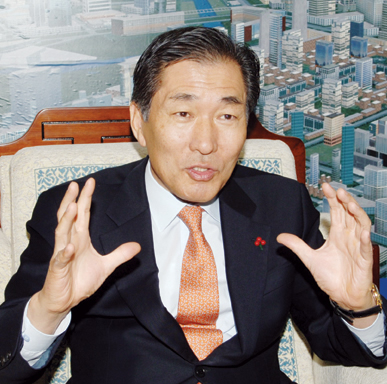 Incheon Metropolitan City is set to gain wider recognition in Korea and abroad, as it will host the Global Fair & Festival 2009 Incheon, which coincides with Visit Korea Incheon Year.
Incheon Metropolitan City is set to gain wider recognition in Korea and abroad, as it will host the Global Fair & Festival 2009 Incheon, which coincides with Visit Korea Incheon Year.
Incheon has been gaining ground toward claiming the title of global hub of logistics and international business, as the city has already become the home of the Incheon Free Economic Zone, which is shaping up as a magnet for foreign direct investment (FDI) and tourists from Korea and abroad.
Incheon, serving as a bridge between China and other parts of the world, has superb, world-class logistics infrastructure, such as Incheon International Airport and Incheon Port, and the development of the IFEZ is picking up speed with the construction of New Songdo City and the dedication of such landmarks as Incheon Bridge, scheduled to open to traffic in the second half of this year.
Visit Incheon Year and the Global Fair & Festival 2009 Incheon will be an opportunity for people from Korea and abroad to get a glimpse into the present and future of the city, full of exotic tourist spots and cultural heritage. The city is also the venue of the 2014 Asian Games, expected to enhance its global standing with the progress of its plan to become a Northeast Asian hub of logistics, business and tourism. The following are excerpts of an interview between Incheon Metropolitan City Mayor Ahn Sang-soo and NewsWorld.
Question: Will you tell our readers about the plan to celebrate Visit Incheon Year in 2009?
Answer: The central government, which launched the Visit Korea Year Program in 2001, has spread the program to regions. In 2009, Incheon is the recipient of the program, which aims at developing tourist products indigenous to the city and building up its own tourist infrastructure.
Visit Incheon Year is expected to have synergetic effects, as it will coincide with the Global Fair & Festival 2009 Incheon, scheduled to be held from August through October. Incheon will offer tourist courses related to the event, city tours and other products, including ones in which tourists in other parts of Korea come to Incheon for one-night and two-days trips after arriving via the railway network from around the nation.
Visit Incheon Year is also designed to divert Korean tourists from foreign destinations to Incheon. The city is turning to the airwaves and other channels to stage a publicity blitzkrieg to publicize Visit Incheon Year and the Festival. Since late last October, the Visit Incheon Year Planning Corps has taken its message on the road to 10 cities including Chuncheon, Busan, Gwangju, Daejeon and Seoul. These road shows have featured artists and entertainers from the region in the form of drifting troupes to publicize the extravaganzas. Incheon has also been engaged in publicity activities by participating in such Korean and foreign exhibitions and fairs as the Asia-Pacific Tourism Investment Conference Expo 2008, held at COEX last October.
Here is a list of Incheon's tourism jewels, each being prepared by the city according to a month of the year in celebration of Visit Incheon Year 2009. The metropolitan city government, focusing on developing new tourist products and building up tourist infrastructure, expects to seize Visit Incheon Year 2009 as an opportunity to show more things to the outside world in the future.
Such events as the Cherry Blossom Festival at Incheon Grand Park, the Azalea Art Festival at Mt. Goryeo and the Octopus Ocellatus Event at Manseok-dong will beckon tourists in April.
May will feature a large number of festivals, including the reenactment of the French invasion in 1896 in protest against the massacre of Catholics during the late Joseon Dynasty at Gwangseongbo Fortress; the Mania Festival will feature such different themes as music, animation, magic and sports every week of the month; and the Incheon Grand Sale, which will give discount prices at conventional markets across the Incheon area. In June, Incheon will offer the Incheon Sea Angling Contest and the walkathon along the barbed-wire entanglements of Ganghwa Island.
In July, there will be the Incheon Pentaport Rock Festival and the Nodureong Lotus Flower Festival, which will feature the reenactment of a ceremony designed to celebrate the relocation of Tripitaka Koreana and traditional dancing performances, while the Incheon Maritime Festival, which will offer such experiences as maritime camp life and shipboard tours, will be held in August.
In September, about 100,000 Incheon citizens will take part in a mammoth event to celebrate the opening of the Incheon Bridge slated for October. It will be a race across the 21.3 km-long bridge by foot, in-line skates, bicycle or motorcycle, which will be followed by the Incheon Food Culture Festival and the Incheon-China Day anniversary event. In October, there will be the Incheon Soraepogu Inlet Festival, the Incheon International Crown Mime Festival and the Incheon International Fireworks Festival as well as the Chinatown Festival and the Weolmido Culture Festival.
In particular, tourists are expected to flood the city during the period between August and October when the Global Fair & Festival 2009 Incheon and the Art Circus will be held.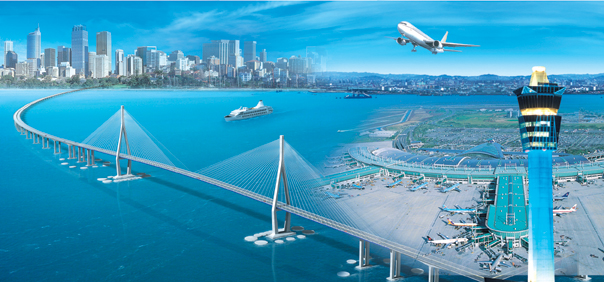
Q: Will you give the specifics of the Global Fair & Festival 2009 Incheon, including the significance of the city's hosting of the event and its expected benefits?
A: The Global Fair & Festival 2009 Incheon will raise its curtain at the New Songdo International City area on Aug. 7 under the theme "Lightening Tomorrow, an 80-day Tale of the Future City." The event will last until Oct. 25. The event suffered a setback when the International Exhibitions Bureau disputed the original name of the event, the "Incheon World City Expo," but it changed it to the current name and preparations now continue without a hitch.
The Global Fair & Festival 2009 Incheon Organizing Committee launched the construction of infrastructure for the main venues at the third construction section of the New Songdo International City in mid-November. The place will be reborn as a "small city" full of excitement and fun in June when various infrastructure and structures are in place. Following a test-operation for the whole of July, the city will begin to narrate the 80-day tale of the future city on Aug. 7, under a sky bedecked with 2,009 kites.
Surveys show that the event is projected to bring about production induction effects worth 1.15 trillion won, value-added induction effects worth 530 billion won and income induction effects worth 300 billion won. It is forecast to create about 10,000 jobs, partly contributing to shoring up the slumping economy. A more important thing is that it has greater invisible effects than numerical benefits. Incheon's successful hosting of the event, designed to publicize the city and attract FDI, will likely enhance the city's brand value and the pride of its citizens.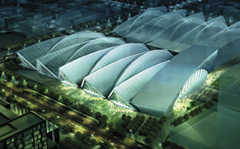
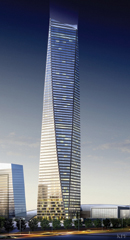 The event will be a good opportunity not only for city participants to stage their city marketing activities and network with each other, but also for businesses to find Incheon a better place to invest, a pleasant environment for people to live and a fantastic city for tourists to visit.
The event will be a good opportunity not only for city participants to stage their city marketing activities and network with each other, but also for businesses to find Incheon a better place to invest, a pleasant environment for people to live and a fantastic city for tourists to visit.
It boasts as many as 65 programs ¡ª 31 exhibitions, 17 events and 17 conferences.
The main venues will be built up according to four theme categories ¡ª advanced technology & environment/energy, tourism & leisure, development of a new city and events. Spectators will get a glimpse of the present and future of the development of the city via three-dimensional images at the Advanced Technology Pavilion.
Exhibitions and events that will feature the world of advanced technologies, including robotics will be thrown open. Participating cities will showcase their unique cultures, while such themes as the Incheon Free Economic Zone (IFEZ), Pan-Yellow Sea Port and culture & tourism will be presented to spectators.
The Environment/Energy Pavilion will awaken audiences to the importance of the environment. The Global Culture Streets will be a mesmerizing and memorable festival-in-a-festival in which spectators may feel like they are making their way around the world.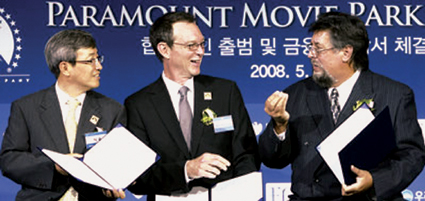
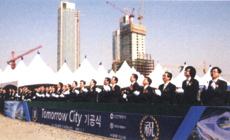
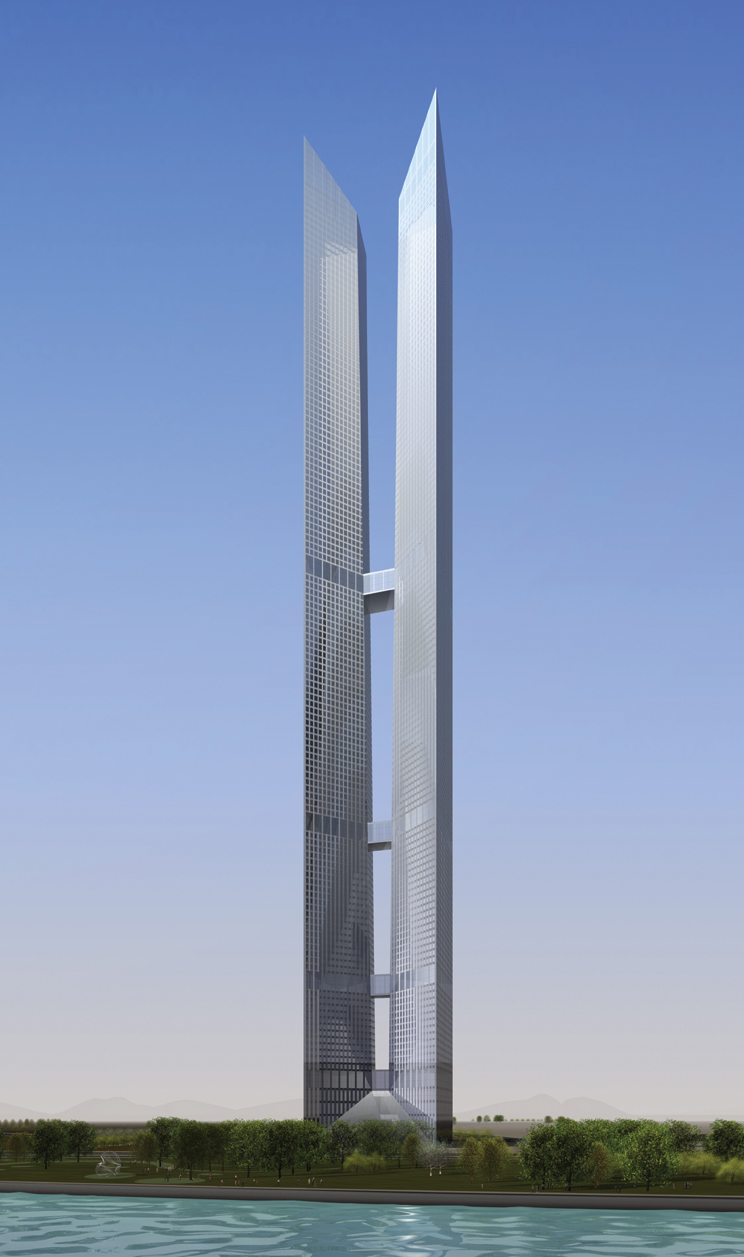
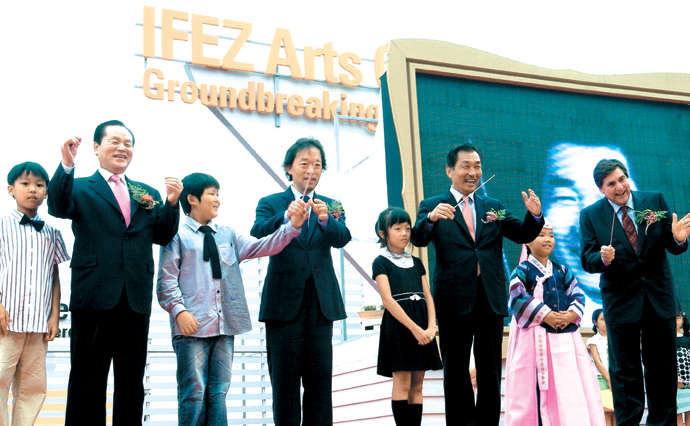
Such international conferences as the Asia Pacific Cities Summit (APCS), a gathering of policy-makers and business people, and the World Knowledge Forum, a symposium of prominent scholars, will be held at Songdo Conventia and other convention centers during the 80-day period.
The Global Fair & Festival 2009 Incheon will have an educational yet fun design in which children will experience life in future cities, enjoy international robotic soccer matches and other exciting events. The futuristic city, "Tomorrow City," and the Songdo Conventia, a magnet for globally-renowned academicians, will be recommended for children in addition to the Environment/Energy Pavilion where they can experience futuristic vehicles made with environmentally-friendly technology and the Global Culture Streets in which children might think they were standing in the back alleys of Africa or Southeast Asia.
Q: Will you elaborate on the current status and future plans to develop the Incheon Free Economic Zone (IFEZ)?
A: The Incheon Free Economic Zone Authority (IFEZA) has established the IFEZ Vision 2020, a comprehensive development plan being implemented in three stages ¡ª the first development stage from 2003 through 2009, the second stage from 2010 through 2014 and the third stage from 2015 through 2020. The first development stage is to be completed in time for hosting the Global Fair & Festival 2009 Incheon, while the second stage is scheduled to finish in time to play host to the 2014 Asian Games. All construction sections of the infrastructure development project for New Songdo International City, except Sections 10-11, will be dedicated before the 2014 Asian Games, with major projects such as Songdo Conventia, Songdo International School, Central Park, the Jack Nicklaus Country Club and the u-City Experience Hall slated to be in place by the end of the year. The projected 65-story Northeast Asia Trade Tower and the planned 151-story Incheon Tower are to be built by 2014 when the city hosts the Asian Games.
Five artery roads leading to Yeongjong International Airport City as well as major architectural structures and infrastructure of the Yongyu and Mui Tourism Districts will be dedicated by 2014. The infrastructure of the Unbok comprehensive leisure complex and the Fiera Incheon in the Yeongjong Convention Center Complex will be completed by 2010 and 2017, respectively.
The infrastructure of the Cheongna Leisure District and site buildup will be completed by 2012. The district, covering 180,000 sq. km, will be developed as a center of various entertainments, sports, advanced floriculture and international financing and a resting area for foreign tourists and tourists from the Seoul metropolitan area.
2009 is sure to be a stellar year when IFEZ shapes up as a "differentiated, dream hub of global business," with the completion of the first development stage.
IFEZ has made extensive progress in its development with the reclamation of the 5.6 sq. km IFEZ area and the dedication of major projects, including Songdo Conventia and 15 environmentally-friendly parks and the launch of such megaprojects as the Northeast Asia Trade Center, a shopping/hotel/department store complex and the Jack Nicklaus Country Club. Among the projects to be dedicated according to the first development stage by the end of the year are the Songdo International School, Incheon Bridge, the extension of the Incheon subway, Songdo Central Park and the opening of the University of Incheon Songdo Campus.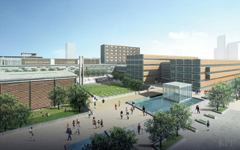
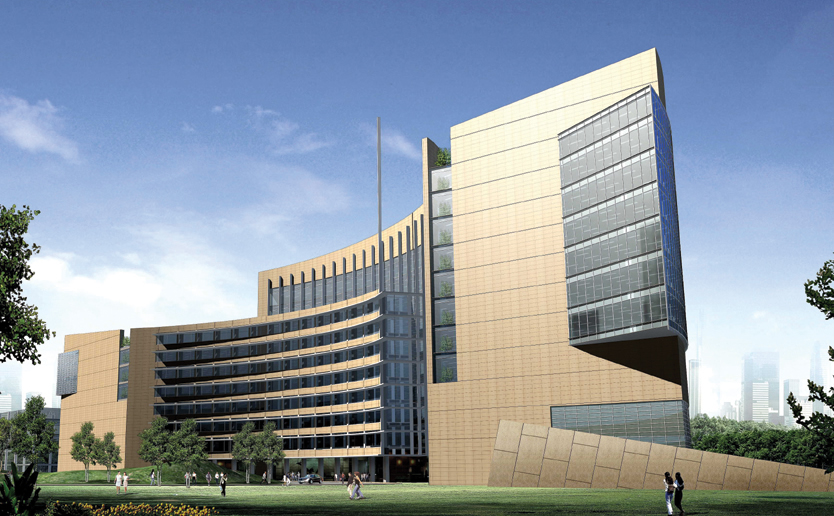
Q: Will you speak about your city's geographical location as a business hub of Northeast Asia and its strong points as a logistics center?
A: The progress of the Incheon Bridge, scheduled for dedication by October, is now 87 percent complete. It is the fifth largest cable-stayed bridge with the potential of becoming a tourist spot, similar to the Sydney Harbor Bridge. The municipal government is seeking to develop tourist resources related to the bridge by implementing such projects as landscape lighting and the creation of an artificial islet. Incheon will hold an international marathon, an in-line skating contest and a walkathon across the bridge in celebration of its opening, a move designed to highlight it as both an international landmark and publicize Incheon as a tourist attraction along with Incheon International Airport.
Incheon is situated at an optimum place from which to serve as a Northeast Asian hub, as Hong Kong and Singapore do in their regions. The city, in close proximity to China and its population of 1.3 billion, has excellent access to major cities in Northeast Asia since it is located within a 3-hour flight to 61 cities with populations of more than 1 million each.
Domestically, Incheon is not only close to the Seoul metropolitan area with a population of 25 million, but also has the strong point of potentially serving as a bridgehead designed to promote inter-Korean exchanges.
Second, the city has excellent sea & air infrastructure with Incheon International Airport, which ranks third in terms of cargo and 10th in terms of passenger handling in the world, and the 20-year, overhauled Incheon Port.
Third, Incheon could have spillover effects for upstream and downstream industries due to its proximity to high-tech complexes in the Seoul metropolitan area and the easy availability of manpower for the IT and BT industries.
I have confidence that a combination of its sea & air infrastructure, Korea's financing/technology/R&D centers and the indigenous Korean Wave (Hallyu), coupled with the public's approval, will surely elevate the IFEZ into a full-fledged, top-rated business center of Northeast Asia offering a better investment environment than China.
The IFEZ will serve as a stable springboard for businesses that want to enter China, emerging as the world's factories, and the addition of the acceleration of inter-Korean economic cooperation as a strong point will have tremendous synergetic effects. It is likely to emerge as a center of economic integration in Asia, bringing together South and North Korea, Japan and China as exchanges among nations and cities become brisker. In particular, Pyeongyang's expansion of its manufacturing base from the Gaeseong Industrial Complex and more exchanges with the IFEZ would cut down on inter-Korean reunification costs. Making the most of the synergetic effects with the Gaeseong Industrial Complex, the IFEZ will lead the future of Asia and evolve into a global trade center by forming a global aviation network via Incheon International Airport, connecting the continental railway network to Eurasia and linking the sea network via Incheon port, the largest one in the Pan-Yellow Sea sphere.
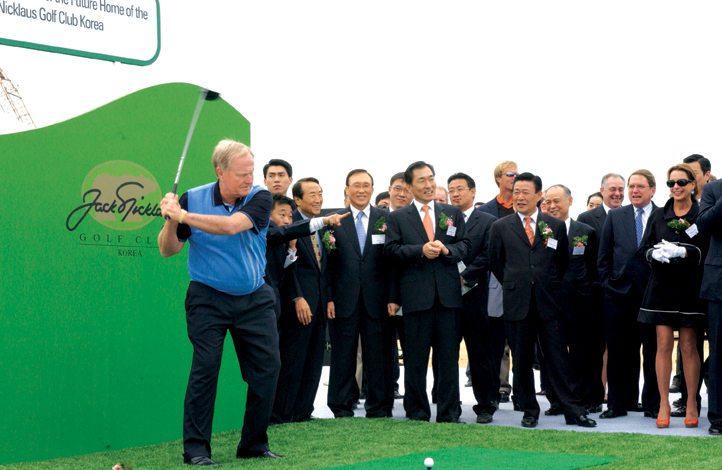 Q: Will you explain measures to improve foreigners' business and living environments and invigorate FDIs?
Q: Will you explain measures to improve foreigners' business and living environments and invigorate FDIs?
A: Since its inception in 2003, the IFEZ has laid an institutional base and infrastructure to facilitate foreign direct investments and has strived to create living conditions for attracting world-class companies. Such megaprojects as the Incheon Bridge, Central Park, Foreign School, Northeast Trade Tower and shopping malls are scheduled to be complete in one to two years. The IFEZ is seeking to attract the Guggenheim Museum, an A1 car-racing track and an ecological hall.
Most of the FDIs have so far related to construction projects and a few foreign investment companies. An inflow of FDIs is insufficient for the IFEZ to serve as a hub of Northeast Asia. The IFEZ needs to have a strategy to continuously attract such anchor companies as large-sized firms in the mid- and long-term perspective and allure SMEs with excellent technology in the short term. It strives to attract world-class blue-chip companies participating in such infrastructure projects as the ubiquitous-City Project to build industrial complexes to have synergetic effects with multinational corporations, world-class SMEs with excellent technology and domestic companies. The IFEZ plans to develop itself as a top-rated hub of education and R&D by attracting such educational institutions as foreign universities and building R&D parks in order to improve educational conditions for foreigners and form a knowledge industry-based collaboration cluster among industry, academic and research circles.
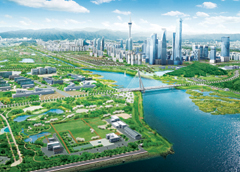
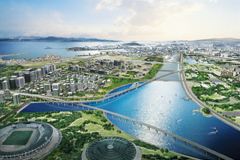
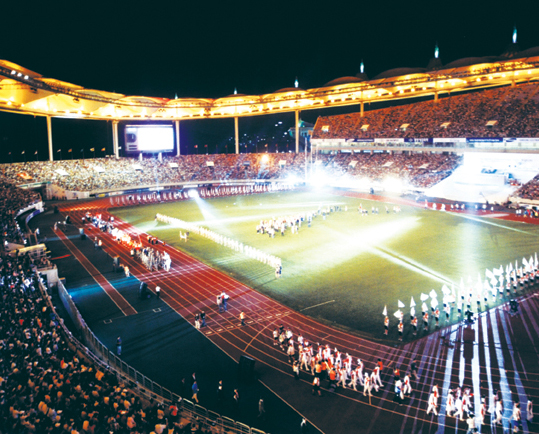
Q: Will you tell us about the preparations for hosting the 2014 Asian Games and what economic and other benefits will the Asiad bring with it?
A: The 17th Incheon Asian Games will be held from Sept. 19, 2014 through Oct. 4, and about 20,000 athletes from 45 countries are expected to participate, making it one of the world's largest sports competitions together with the Olympic Games and the FIFA World Cup. The Asiad will not only bring immense economic effects ¡ª approximately 13 trillion won in production induction effects, 5.6 trillion won in value-added production and the creation of 270,000 jobs, but it will also cement economic and cultural ties with other Asian countries.
The Asian Games will serve as a catalyst for Incheon to accelerate the development and innovation of the IFEZ and the old downtown area and elevate it as a brand city as well as provide an opportunity for the nation to upgrade its standing. Sports facilities being built for the Asiad will be made available for citizens. On Jan. 22, the city government decided to attract investments from the private sector to build a 70,000-seat main stadium with a combined floor space of 175,700 sq. meters on a lot of 585,300 sq. meters in the Yeonhui-dong area in Seo-gu.
Q: Will you introduce your government's mid- and long-term development plans?
A: Given the current of the times in which cities around the world are becoming more urbanized and their competiveness determines a nation's competitive edge, the municipal government has been implementing a project to transform the city into a competitive, brand metropolis with the world's top-rated airport, sea port and other pristine natural resources.
We strive to create a "brand city," meaning a forward-looking city where anyone would want to live, in the way many desire to have brand-name bags, watches and clothes. Based on a sufficient infrastructure, essential for evolving into a global city with a competitive edge, the city government has carried out various projects to elevate Incheon into the world's top 10 metropolises by 2020. The construction of the IFEZ and balanced urban development, the Global Fair & Festival 2009 Incheon and the 2014 Asian Games are expected to help upgrade the city's standing as an international city.
In order to upgrade Incheon as a brand metropolis, the city government has set four goals: making Incheon an international city, an environmentally-friendly one, an education-oriented one and a safe one. It has been implementing these top 10 policies: making Incheon a city with a unique image; turning it into a global hub; developing it into a city of creative culture and arts; making it into one with a scenic landscape; a city in harmony with nature; a human-oriented city of traffic and culture; a city of human resources development; a city of learning for life; a city of leisureliness and stability; and a city of sharing, caring and participating. It has also been performing phase project goals and action tasks to help Incheon join the ranks of the global top 10 cities. nw
Incheon Mayor Ahn Sang-soo
The Incheon Free Economic Zone is set to emerge as a "differentiated, dream hub' of global business" with the completion of the first development project in late 2009, including the dedication of such mega-infrastructure as Incheon Bridge.
(right) The planned Conventia and Northeast Asia Trade Center.
Mega-projects are under way in the IFEZ area. (from far right, counterclockwise) The projected 'Tomorrow City,'; the planned Paramount Theme Park,; the projected Songdo Arts Center,; and the landmark, 151-story Incheon Tower.
(left)The projected Songdo International School and a foreign hospital.
Jack Nicklaus tees off in a ceremony to launch the construction of the Jack Nicklaus Country Club, designed by the globally renowned golf czar.
(left) The planned City Tower, being developed as the Korean version of Venice, in Cheongna District, part of the IFEZ,; an aerial view of Songdo International City; and the Munhak Stadium, a venue of the 2014 Incheon Asian Games.
3Fl, 292-47, Shindang 6-dong, Chung-gu, Seoul, Korea 100-456
Tel : 82-2-2235-6114 / Fax : 82-2-2235-0799